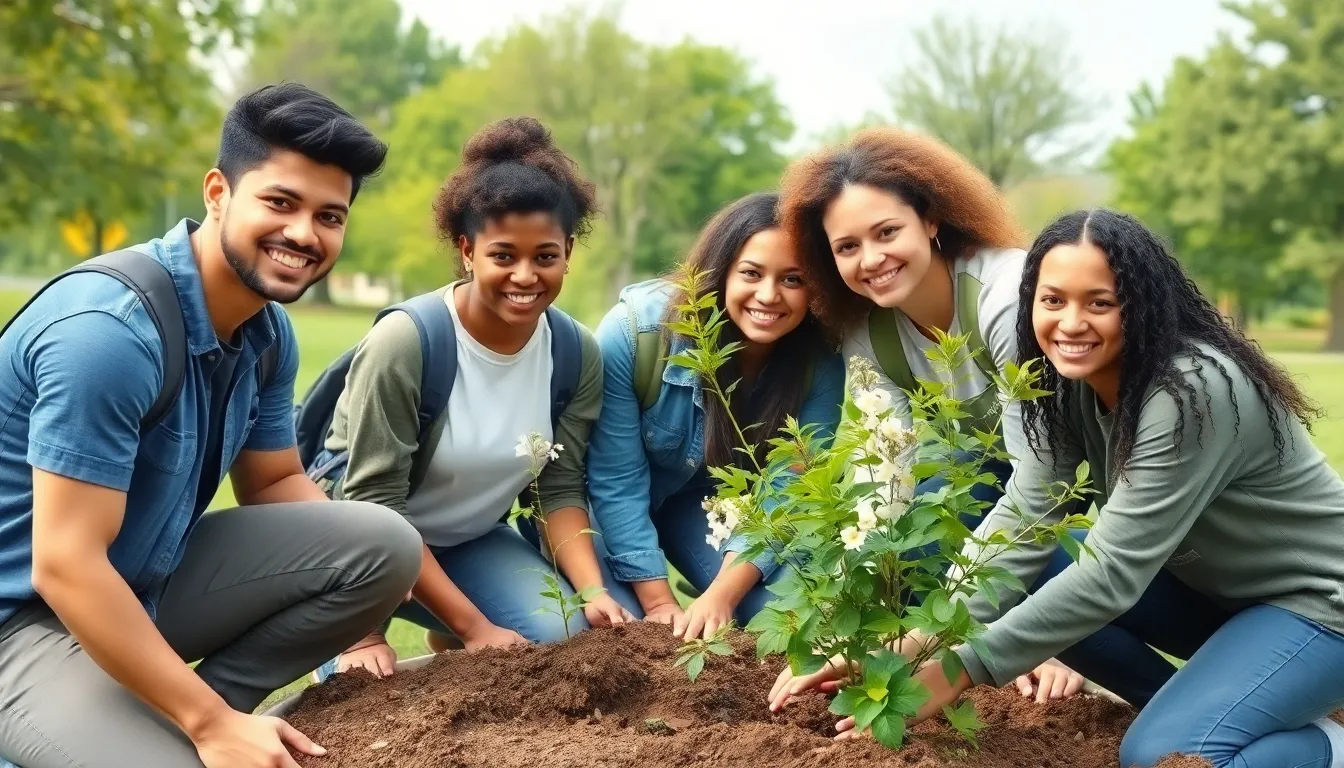In a world where scrolling through social media can feel like a full-time job, young adults are discovering that lending a hand can be just as rewarding—without the pesky side effects of thumb cramps. Volunteering isn’t just about filling up a resume; it’s a chance to dive into new experiences, meet fascinating people, and make a real impact. Plus, who wouldn’t want to add “hero” to their list of accomplishments?
Table of Contents
ToggleOverview of Young Adult Volunteering
Young adult volunteering encompasses various opportunities that allow individuals to contribute positively to society. Programs exist in diverse settings, including education, healthcare, and environmental conservation. Engaging in these activities builds skills, provides experience, and enhances personal growth.
Volunteering fosters community connections. Young adults meet peers with shared interests, creating friendships that enhance their social networks. They gain insight into different cultures and lifestyles, enriching their perspectives.
Benefits extend beyond social connections. Research shows volunteering can lead to improved mental health. According to a study by the Corporation for National and Community Service, those who volunteer report higher life satisfaction. Engaging in meaningful work reduces stress and promotes a sense of purpose.
Skills developed during volunteer work are valuable in the job market. Critical thinking, teamwork, and leadership abilities are often enhanced through real-world experiences. Employers increasingly recognize the worth of these skills, which may set candidates apart in competitive job environments.
Choosing to volunteer locally connects individuals to their communities. Local programs often tackle pressing issues, such as homelessness and education disparities. Young adults can witness the direct impact of their efforts, fostering a sense of accomplishment and motivation.
Involvement in international programs provides unique experiences. Traveling to different countries exposes young adults to global challenges while promoting cultural exchange. These experiences often shape a lifetime commitment to service and social responsibility.
Ultimately, young adult volunteering invites individuals to participate actively in society. Making a difference contributes positively to personal development while addressing important community needs.
Benefits of Young Adult Volunteering

Young adult volunteering offers numerous advantages that extend well beyond personal gain. Participants often experience significant personal growth and development.
Personal Development
Volunteering enhances self-esteem and confidence. Young adults often build valuable skills like leadership and communication through hands-on experiences. Participants discover new interests while engaging with diverse groups. Exposure to different environments fosters adaptability and resilience, critical traits in today’s world. Volunteering also encourages reflection on personal values, prompting individuals to think deeply about their roles in society. Research consistently shows that young adults who volunteer report improved mental health outcomes. They experience increased life satisfaction and a greater sense of purpose, which contributes to overall well-being.
Community Impact
Volunteering creates meaningful change within communities. Young adults contribute time and effort to address local challenges like food insecurity and environmental sustainability. Collaborating with local organizations allows them to witness the tangible effects of their work on community issues. They also forge connections with community members, fostering a sense of belonging and purpose. Volunteer initiatives promote awareness about pressing social issues, inspiring others to join in. Studies indicate that volunteers play a crucial role in strengthening community ties, which enhances social cohesion. Ultimately, young adult volunteering cultivates a spirit of civic engagement that benefits both individuals and society as a whole.
Challenges Faced by Young Adult Volunteers
Young adult volunteers encounter various challenges that can impact their experiences and contributions.
Time Management
Balancing volunteer commitments with school, work, and social activities often presents difficulties for young adults. Many struggle to find sufficient time to dedicate to community service while managing personal responsibilities. Effective prioritization of tasks becomes vital to ensure consistency in volunteering. Developing a schedule that accommodates all obligations allows for a more manageable approach to both volunteering and personal life. Utilizing tools like calendars or apps helps volunteers stay organized, ensuring they meet all commitments without compromising their education or job performance.
Resource Accessibility
Limited access to resources can hinder young adult volunteers from fully engaging in their chosen initiatives. Often, transportation difficulties prevent them from reaching volunteer sites, especially if programs are located in remote areas. Financial constraints may also impact their ability to participate in programs that require fees or materials. Organizations can play a crucial role by providing necessary resources and support, such as transportation services or scholarships, fostering greater accessibility. By addressing these barriers, community programs ensure a more inclusive environment for all young volunteers, encouraging wider participation.
Opportunities for Young Adult Volunteering
Numerous opportunities exist for young adults to engage in meaningful volunteer work. These options enrich experiences while fostering personal growth and community connections.
Local Organizations
Various local organizations offer structured volunteering programs tailored for young adults. Food banks regularly seek assistance to sort donations and distribute meals. Schools appreciate volunteers who can tutor students or help organize events. Environmental groups welcome young adults to participate in clean-up initiatives and tree-planting projects. Nonprofits focusing on mental health often recruit volunteers for outreach programs and support groups. These local efforts create direct benefits for communities and allow volunteers to witness the positive impact of their contributions.
Virtual Volunteering
Virtual volunteering provides accessible opportunities for young adults engaging from home. Online tutoring programs enable individuals to support students in various subjects, enhancing educational outcomes. Organizations frequently seek tech-savvy volunteers for tasks like graphic design, social media management, and content creation. Platforms dedicated to environmental awareness offer virtual campaigns and events where young adults can participate and advocate for sustainability. These options facilitate meaningful connections while embracing flexibility, making it easier for young adults to contribute their skills without geographical limitations.
Young adult volunteering is a powerful vehicle for personal growth and community impact. By stepping into various roles, young individuals not only develop essential skills but also cultivate a sense of belonging and purpose. The experiences gained through volunteering enrich lives and foster connections with diverse communities.
As young adults navigate the challenges of balancing commitments, the rewards of volunteering far outweigh the obstacles. With the rise of virtual opportunities, engaging in meaningful work has never been more accessible. Ultimately, volunteering shapes not only the volunteers themselves but also the communities they serve, creating a ripple effect of positive change.



